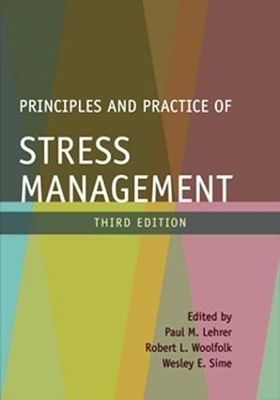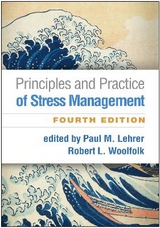
Principles and Practice of Stress Management
Guilford Publications (Verlag)
978-1-60623-000-8 (ISBN)
- Titel erscheint in neuer Auflage
- Artikel merken
Structured for optimal use as a clinical reference and text, this comprehensive work reviews effective stress management techniques and their applications for treating psychological problems and enhancing physical health and performance. Leading experts present in-depth descriptions of progressive relaxation, hypnosis, biofeedback, meditation, cognitive methods, and other therapies. Tightly edited chapters examine each method’s theoretical and empirical underpinnings and provide step-by-step guidelines for assessment and implementation, illustrated with detailed case examples. The volume also explains basic mechanisms of stress and relaxation and offers research-based guidance for improving treatment outcomes.
New to This Edition:
*Incorporates significant empirical, theoretical, and clinical advances.
*Chapters on mindfulness meditation, neurofeedback, EMDR, breathing retraining, heart rate variability biofeedback, exercise therapy, Qigong, sport psychophysiology, and basic mechanisms of stress and relaxation.
Paul M. Lehrer, PhD, is a clinical psychologist and Professor of Psychiatry at the University of Medicine and Dentistry of New Jersey-Robert Wood Johnson Medical School. He has published more than 100 articles and chapters, mostly on biofeedback, psychophysiology, and cognitive-behavioral therapy. Dr. Lehrer is past president of the Association for Applied Psychophysiology and Biofeedback and has received their Distinguished Scientist Award. He also recently served as president of the International Society for the Advancement of Respiratory Psychophysiology and of the International Stress Management Association-USA Branch (ISMA-USA). Robert L. Woolfolk, PhD, is Professor of Psychology and Philosophy at Rutgers, The State University of New Jersey, and Visiting Professor of Psychology at Princeton University. He has published widely on psychotherapy, psychopathology, and the philosophical foundations of psychology. A practicing clinician for more than 30 years, Dr. Woolfolk has sought in both his practice and research to integrate the scientific and humanistic traditions of psychotherapy. Wesley E. Sime, PhD, is a health psychologist and stress physiologist and Professor in the Department of Nutrition and Health Science at the University of Nebraska-Lincoln. He is past chair of both the Biofeedback Certification Institute of America and ISMA-USA. Dr. Sime was an early contemporary of Hans Selye and Edmund Jacobson and continues to facilitate stress management developments with Paul Rosch, Charles Spielberger, and James Quick. He is also a consultant in medical and sports performance settings.
I. Introduction
1. Conceptual Issues Underlying Stress Management, Robert L. Woolfolk, Paul M. Lehrer, and Lesley A. Allen
2. Psychophysiological Mechanisms of Stress: A Foundation for the Stress Management Therapies, Angele McGrady
3. The Psychology of Relaxation, Jonathan C. Smith
II. Stress Management Methods
A. Muscle Relaxation
4. Progressive Relaxation: Origins, Principles, and Clinical Applications, F. J. McGuigan and Paul M. Lehrer
5. Progressive Relaxation: Abbreviated Methods, Douglas A. Bernstein, Charles R. Carlson, and John E. Schmidt
B. Hypnotic Methods
6. Hypnosis in the Management of Pain and Stress: Mechanisms, Findings, and Procedures, Robert A. Karlin
7. The Autogenic Training Method of J. H. Schultz, Wolfgang Linden
8. Autogenic Feedback Training in Psychophysiological Therapy and Stress Management, Patricia A. Norris, Steven L. Fahrion, and Leo O. Oikawa
C. Biofeedback
9. Psychophysiological Perspectives on Stress-Related and Anxiety Disorders, Richard N. Gevirtz
10. Biofeedback Training to Increase Heart Rate Variability, Paul M. Lehrer
11. Neurofeedback for Stress Management, Michael Thompson and Lynda Thompson,
D. Breathing Retraining and Exercise
12. Whole-Body Breathing: A Systems Perspective on Respiratory Retraining, Jan van Dixhoorn
13. Exercise Therapy for Stress Management, Wesley E. Sime
E. Methods Based on Eastern Meditative and Therapeutic Disciplines
14. Modern Forms of Mantra Meditation, Patricia Carrington
15. Mindfulness Meditation, Jean L. Kristeller
16. Qigong Therapy for Stress Management, Kevin W. Chen
17. Yoga as a Therapeutic Intervention, Sat Bir S. Khalsa
F. Cognitive Methods
18. Cognitive Approaches to Stress and Stress Management, James L. Pretzer and Aaron T. Beck
19. Stress Inoculation Training: A Preventative and Treatment Approach, Donald Meichenbaum
G. Other Methods
20. Music Therapy: Applications to Stress Management, Cheryl Dileo and Joke Bradt
21. Eye Movement Desensitization and Reprocessing and Stress: Research, Theory, and Practical Suggestions, Lee Hyer and Bonnie Kushner
22. Pharmacological Approach to the Management of Stress and Anxiety Disorders, Laszlo A. Papp
III. Integration
23. Sport Psychophysiology and Peak Performance Applications of Stress Management, Paul Davis, Wesley E. Sime, and James Robertson
24. Differential Effects of Stress Management Therapies on Emotional and Behavioral Disorders, Jonathan M. Feldman, Erika J. Eisenberg, Eduardo Gambini-Suárez, and Jack H. Nassau
25. Stress Management and Relaxation Therapies for Somatic Disorders, Nicholas D. Giardino, Angele McGrady, and Frank Andrasik
26. Research on Clinical Issues in Stress Management, Paul M. Lehrer and Robert L. Woolfolk
| Erscheint lt. Verlag | 30.11.2008 |
|---|---|
| Vorwort | David H. Barlow |
| Verlagsort | New York |
| Sprache | englisch |
| Maße | 178 x 254 mm |
| Themenwelt | Geisteswissenschaften ► Psychologie |
| Medizin / Pharmazie ► Medizinische Fachgebiete ► Psychiatrie / Psychotherapie | |
| ISBN-10 | 1-60623-000-X / 160623000X |
| ISBN-13 | 978-1-60623-000-8 / 9781606230008 |
| Zustand | Neuware |
| Haben Sie eine Frage zum Produkt? |
aus dem Bereich



